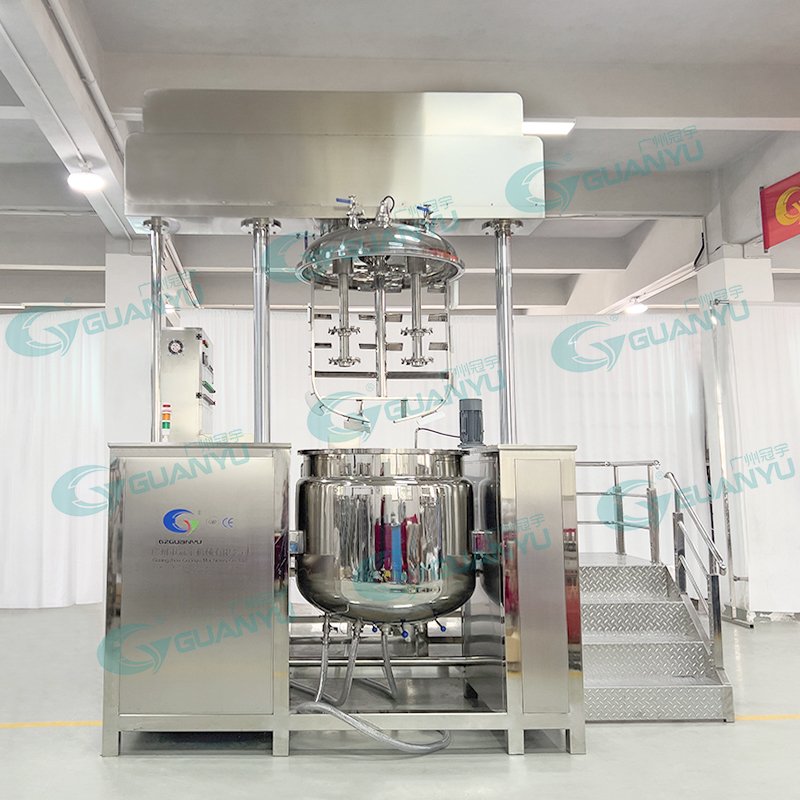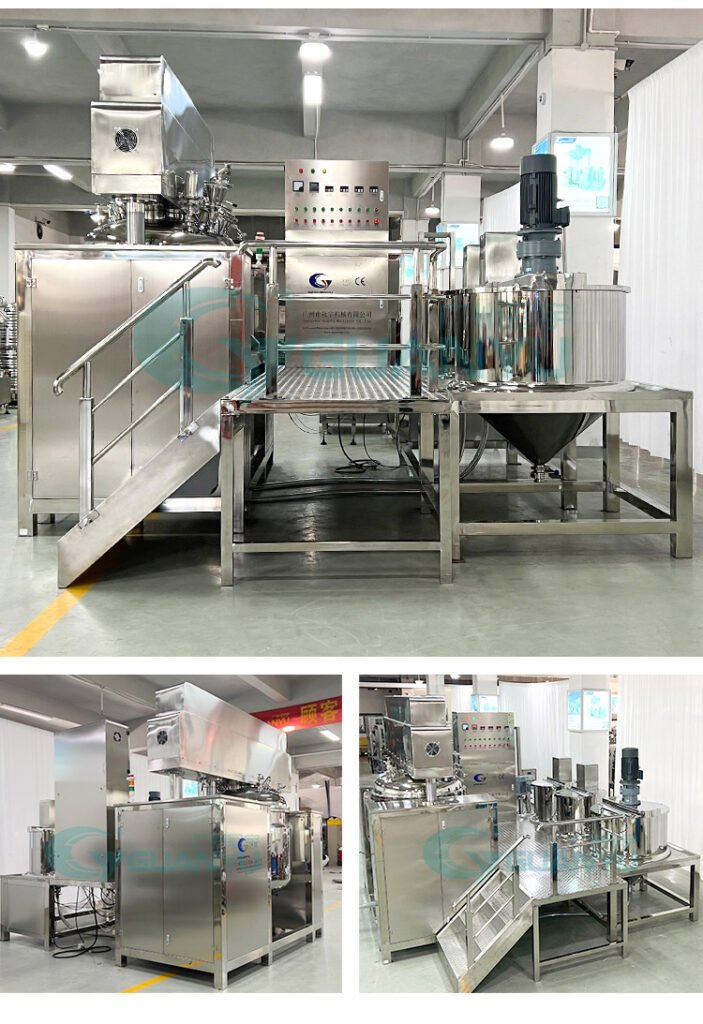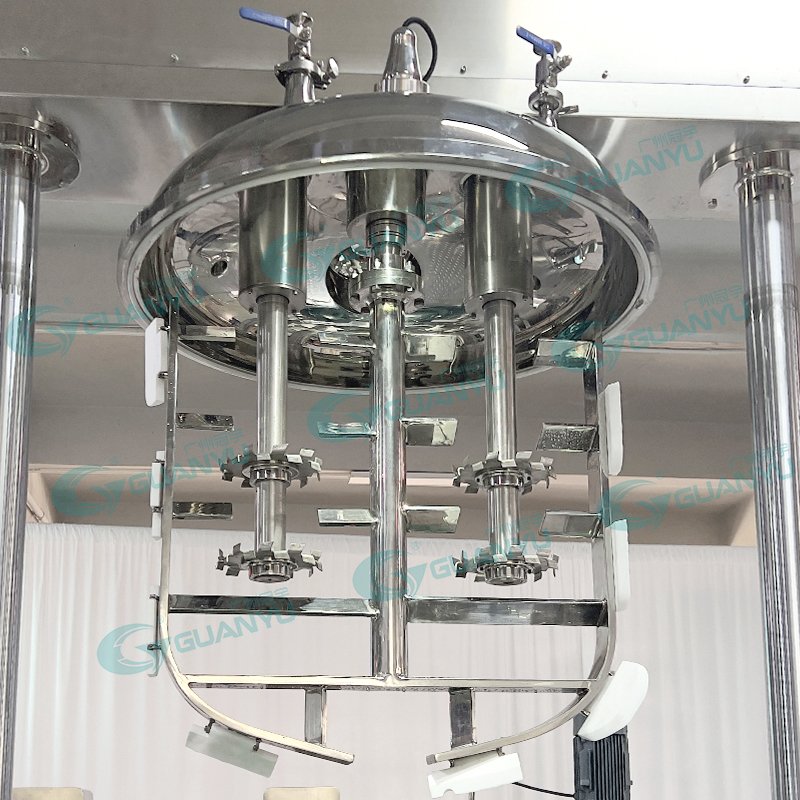介绍
In the fast-evolving personal care industry, 牙膏是最受欢迎的日常必需品之一. 随着消费者对品质的期望不断提高, 一致性, 和口腔卫生产品的创新, 制造商必须投资先进的加工技术. That’s where the toothpaste making machine comes into play—a highly specialized piece of equipment designed to handle the high viscosity and complex formulations of modern toothpaste.
This article offers a comprehensive look at what a professional toothpaste making machine includes, how it enhances production efficiency, and why it is essential for producing high-quality toothpaste at industrial scale.
What is a 牙膏机?
一个 toothpaste making machine is an industrial processing unit used for blending, 分散, 乳化, and homogenizing the ingredients that form toothpaste. Because toothpaste is a high-viscosity material, manufacturing it requires advanced mechanical force, 精确混合, and temperature control to achieve the desired smoothness, 质地, 和稳定性.
Unlike simple mixing tanks, a professional toothpaste machine includes:
- Dispersing systems
- Vacuum mixing vessels
- Oil and water pre-treatment pots
- Heating and cooling jackets
- Vacuum deaeration systems
- Intelligent control systems
These components work together to ensure maximum ingredient integration and superior end-product quality.

Why Toothpaste Requires Specialized Mixing Equipment
Toothpaste contains abrasive particles, thickening agents (like carboxymethyl cellulose or xanthan gum), humectants (such as glycerin or sorbitol), and flavoring or active agents like fluoride or charcoal. These components vary in 密度, 溶解度, and particle size, making the mixing process technically demanding.
1. High Viscosity Challenge
Toothpaste can be 10,000–100,000 centipoise (cP) in viscosity, which is far higher than most liquids or creams. Without the proper mechanical force, these materials resist flow and remain unmixed.
2. Homogeneous Particle Distribution
A high-shear 分散 is critical for ensuring that solid particles (abrasives, additives) are evenly distributed throughout the formulation.
3. Air Bubble Elimination
Air entrapment during mixing can affect product density and shelf stability. 所以, 真空混合 和 deaeration are essential features of modern toothpaste production lines.
Key Components of a Professional 牙膏机
1. Main Vacuum Emulsifying Mixer
This is the heart of the system. It integrates:
- High-speed dispersing blades
- Scraper agitators
- Vacuum pumping system
- Temperature-controlled jackets

It ensures uniform blending under vacuum conditions to eliminate bubbles, reduce oxidation, and stabilize viscosity.
2. Oil Phase Pot (Oil Pot)
Used to melt and pre-mix oil-soluble ingredients like flavors or essential oils. These are typically heated to facilitate solubility and proper incorporation into the main batch.
3. Water Phase Pot (Water Pot)
Used for dissolving water-soluble ingredients such as preservatives, 甜味剂, and binders. Like the oil pot, it may be jacketed and stirred to speed up preparation.
4. Dispersing Disc (High-Shear Disperser)
Located in the main vessel, this component provides intense shear force that breaks down powders and aggregates, ensuring a 美好的, smooth paste. It is especially critical when handling active ingredients like silica, calcium carbonate, or titanium dioxide.

5. 真空系统
Prevents foaming and bubble formation, which is crucial for the product’s appearance and packaging accuracy. It also supports faster mixing by reducing resistance from trapped air.
6. 控制面板 (PLC or Touch Screen)
Automates and monitors the entire production process:
- 搅拌速度
- 温度
- Time
- Vacuum level
- Discharge control
Intelligent systems improve process repeatability, reduce manual errors, and enhance operational safety.
Advantages of Using a Professional Toothpaste Making Machine
1. Superior Product Consistency
A well-integrated system ensures every batch of toothpaste meets the same standards in terms of:
- 质地
- 粘度
- Color and appearance
- Active ingredient distribution
This is crucial for brand reputation and compliance with regulatory standards.
2. Improved Production Efficiency
Modern machines can complete a full mixing cycle—including heating, 分散, 吸尘, and cooling—in significantly less time than traditional equipment. 例如:
- A 300L batch may be completed in under 1 hour
- Batch turnover and cleaning are streamlined
3. Material Yield Optimization
Thanks to scraper agitators and optimized mixing geometry, raw material loss is minimized. Nearly all the contents are converted into usable paste, 减少浪费.
4. Vacuum Operation Benefits
- No foam formation
- Better product texture
- Increased shelf stability
- Enhanced packaging precision (due to consistent density)
5. Adaptability for Multiple Formulas
The same machine can be used to manufacture different types of toothpaste:
- Whitening toothpaste
- Charcoal toothpaste
- Herbal or organic toothpaste
- Fluoride-based or sensitive-teeth toothpaste
With customizable settings, manufacturers can scale and diversify product lines efficiently.
Customization and Technical Options
A professional toothpaste making machine can be tailored to meet specific factory or process requirements. Custom options may include:
– Explosion-Proof Design
For handling volatile or alcohol-based flavor oils.
– Automated Feeding Systems
To handle powders or liquids through metered dosing, reducing labor and contamination.
– CIP (清洁) Systems
Integrated cleaning cycles make equipment maintenance faster and more hygienic.
– Batch or Continuous Operation
Depending on production volume, manufacturers can choose batch or in-line continuous models.
– 容量范围
从 lab-scale (5–20L) 到 industrial scale (500–2000L) 或更多.
How to Choose the Right Toothpaste Making Machine
When selecting a machine, 制造商应考虑:
- Batch size requirements
- Formula complexity
- Product range and diversification
- Factory layout and space availability
- Automation level desired
- Compliance with GMP, FDA, CE standards
Working with an experienced supplier is essential. Reliable manufacturers offer 安装, 操作员培训, technical support, 和 after-sales service to ensure smooth operation from day one.
结论
To stay competitive in the modern oral care market, manufacturers need equipment that combines 精确, 速度, 卫生, 和可靠性. A professional toothpaste making machine provides all these advantages by offering tailored solutions for high-viscosity mixing, 分散, 和 真空加工.
By integrating oil and water phase pre-treatment, high-shear dispersion, 和智能自动化, these machines deliver superior finished product quality while optimizing production costs 和 operational efficiency.
For any manufacturer looking to elevate their toothpaste production capabilities, investing in a high-quality toothpaste making machine is a smart and essential step.

x111gameapk.net, APK heaven or APK hell? Let’s hope for the former! Time to find some new games maybe. x111gameapk
哟, just checked out dangkyok9! Seems like a solid place to get your game on. Definitely worth a look, especially if you’re searching for something new. Check it out for yourselves! dangkyok9
能不能具体说一下你文章的内容? 读完后, 我还是有一些疑问. 希望你能帮助我.
能不能具体说一下你文章的内容? 读完后, 我还是有一些疑问. 希望你能帮助我.
Looking to ‘tải game f88’ – heard the mobile version is pretty good. Anyone got the link and can vouch for it being safe? Don’t wanna download no sketchy stuff, you know? tải game f88
PH333slot… Been spinning some reels there lately. They’ve got a decent selection, and I’ve had a couple lucky hits. Not a bad place to kill some time and maybe win a few pesos! ph333slot
Super easy okbet registration! Took me like two minutes. 强烈推荐! Ready to win big. Go register at okbet registration!